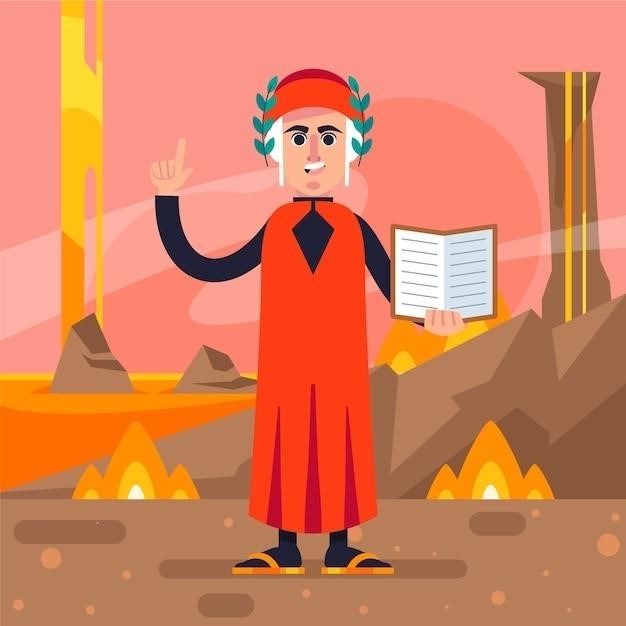Summary of the Book of Exodus⁚ A Comprehensive Overview
Exodus, the second book of the Pentateuch, recounts Israel’s liberation from Egyptian bondage․ It details God’s covenant with Israel, the giving of the Law at Sinai, and the construction of the Tabernacle, establishing the foundation of Israelite identity and their relationship with God․
The Central Theological Event⁚ Deliverance from Egypt
The Book of Exodus centers on the Israelites’ liberation from slavery in Egypt, a pivotal event shaping their national identity and their covenant with God․ The narrative vividly depicts their oppression under harsh conditions, forced labor, and the Pharaoh’s decree to kill newborn Hebrew boys; God, however, hears their cries and chooses Moses, a Hebrew raised in the Egyptian court, as his instrument of deliverance․ Moses’s initial reluctance is overcome through divine encounters and assurances of God’s power․ The ensuing confrontation with Pharaoh involves a series of miraculous plagues, each demonstrating God’s overwhelming might and sovereignty over the Egyptian gods․ These plagues, culminating in the death of the firstborn, finally compel Pharaoh to release the Israelites․
The Passover, a pivotal event within this liberation, marks a transition from slavery to freedom․ The Israelites, marked by the blood of a sacrificial lamb, are spared the final plague․ Their hasty exodus from Egypt, pursued by Pharaoh’s army, culminates in the dramatic parting of the Red Sea, a resounding display of God’s power and a definitive victory over their oppressors․ This miraculous escape establishes a lasting memory and theological foundation for the Israelites and their descendants․
The Covenant Relationship⁚ God’s Promise and Israel’s Response
Following their miraculous deliverance from Egypt, the Israelites’ journey continues towards Mount Sinai, where God establishes a formal covenant relationship with them․ This covenant, central to the narrative of Exodus, signifies a binding agreement between God and his chosen people․ God’s promises include land, protection, and blessings, conditional upon the Israelites’ obedience to his laws․ The covenant is not merely a legal contract but a profound relationship built upon God’s grace and the people’s commitment to follow His commandments․ The giving of the Ten Commandments at Sinai encapsulates the core principles of this covenant, emphasizing ethical behavior, worship, and societal structure․
However, the Israelites’ faithfulness is repeatedly tested․ Their impatience and doubt during the wilderness journey, their construction of the Golden Calf, and their subsequent rebellion demonstrate a recurring pattern of disobedience․ These instances of covenant violation highlight the fragility of the relationship and underscore the human tendency to stray from God’s path․ Despite these setbacks, God’s unwavering commitment to his covenant remains a central theme, emphasizing his mercy, grace, and patience in dealing with his chosen people․ The covenant established at Sinai forms the bedrock of Israel’s identity and sets the stage for their future history․
Moses’s Leadership⁚ From Slave to Liberator
Moses, a pivotal figure in the Book of Exodus, undergoes a remarkable transformation from a humble slave to a powerful leader․ Initially raised in Pharaoh’s household, he later identifies with his Israelite heritage, witnessing firsthand their suffering under Egyptian oppression․ This experience fuels his commitment to liberating his people․ God calls upon Moses, initially hesitant and self-doubting, to confront Pharaoh and demand the release of the Israelites․ Moses’s leadership is characterized by his unwavering faith in God’s power, despite facing numerous obstacles and challenges․ His ability to communicate God’s will to Pharaoh and the Israelites is crucial to the narrative’s success․
Throughout the Exodus journey, Moses acts as an intermediary between God and his people, conveying divine instructions and guidance․ He performs miracles, demonstrating God’s power and validating his authority․ His leadership extends beyond the initial liberation, encompassing the arduous journey through the wilderness, the negotiation of God’s covenant, and the establishment of Israelite law․ Moses’s role as a mediator, lawgiver, and spiritual leader exemplifies the qualities of effective leadership, demonstrating courage, perseverance, and unwavering devotion to God’s plan․ His journey from slavery to liberation mirrors the Israelites’ own transition, reflecting the transformative power of faith and divine intervention․ Moses’s leadership establishes the foundation for the formation of the Israelite nation․
The Ten Plagues⁚ Divine Judgment and Power
The ten plagues serve as a dramatic demonstration of God’s power and judgment against Pharaoh’s stubborn refusal to free the Israelites from slavery․ Each plague escalates in severity, impacting various aspects of Egyptian life and society․ Beginning with the Nile turning to blood, rendering the water undrinkable, the plagues progressively worsen, affecting livestock, humans, and the environment․ Boils, locusts, darkness, and the death of the firstborn are among the devastating events that unfold․ These plagues are not merely random acts of destruction, but carefully orchestrated displays of divine power intended to convince Pharaoh of God’s sovereignty․
The plagues highlight the contrast between the power of God and the power of Pharaoh, underscoring God’s unwavering commitment to fulfilling His promise to Abraham․ They serve as a powerful reminder of the consequences of defying God’s will and the immense power He possesses to deliver His chosen people․ The plagues also emphasize the vulnerability of even the most powerful earthly rulers before the divine power of God․ The narrative of the plagues underscores the theological significance of God’s intervention in human affairs, demonstrating His ability to act decisively and dramatically in the face of injustice and oppression․ The final plague, the death of the firstborn, compels Pharaoh to finally release the Israelites, marking a pivotal moment in their liberation․
The Passover⁚ A Symbol of Redemption and Freedom
The Passover, a pivotal event in the Book of Exodus, marks the culmination of the ten plagues and the Israelites’ liberation from Egyptian slavery․ It’s a divinely ordained event where the angel of death “passed over” the houses of the Israelites marked with the blood of a sacrificed lamb, sparing their firstborn sons while striking the firstborn of the Egyptians․ This act of divine protection signifies God’s intervention and establishes the Passover as a perpetual memorial of God’s deliverance․ The Passover lamb itself becomes a powerful symbol of the sacrificial lamb, foreshadowing the ultimate sacrifice of Jesus Christ․
The Passover Seder, a ritual meal observed annually, vividly recounts the story of the Exodus, emphasizing the themes of redemption, freedom, and God’s faithfulness to His promises․ The Seder incorporates symbolic foods representing various aspects of the Exodus story, creating a powerful and multi-sensory experience that connects generations to this pivotal moment in Jewish history․ The Passover meal is more than just a historical commemoration; it’s a living tradition that reaffirms the ongoing covenant relationship between God and His people․ The act of eating the Passover meal serves as a constant reminder of God’s unwavering love and power to liberate His people from oppression․
The Exodus Journey⁚ From Slavery to Sinai
Following the dramatic Passover event and escape from Egypt, the Israelites’ journey to Mount Sinai is far from straightforward․ Their newfound freedom is immediately tested by the harsh realities of the wilderness․ The narrative vividly portrays their dependence on God for sustenance and guidance, highlighting moments of both faith and doubt․ God provides miraculously, sending manna from heaven and water from a rock, but the Israelites repeatedly murmur and question God’s leadership, revealing their inherent human frailty and tendency towards impatience․
This arduous journey isn’t merely a geographical relocation; it’s a spiritual pilgrimage․ The wilderness experience serves as a crucible, refining the Israelites’ faith and shaping their collective identity․ They move from a people enslaved in Egypt to a people learning to trust and obey God in a new and challenging environment․ The challenges they face underscore their vulnerability and dependence on divine intervention, preparing them for the momentous encounter with God at Mount Sinai, where they receive the Law and enter into a formal covenant relationship․
The Giving of the Law at Sinai⁚ The Covenant Code
The pivotal event at Mount Sinai is the giving of the Law, a defining moment in the Israelite narrative․ Moses ascends the mountain, receiving the Ten Commandments directly from God, which are foundational to the covenant relationship․ These commandments, etched in stone, represent God’s moral and ethical standards, forming the basis for a just and righteous society․ The subsequent chapters detail a more extensive legal code, encompassing various aspects of Israelite life, from civil and criminal law to ritual practices and social regulations․
This legal framework isn’t merely a set of rules; it reflects God’s desire for a community that reflects His holiness and justice․ The covenant established at Sinai is a reciprocal agreement⁚ God promises to be their God, guiding and protecting them, while the Israelites pledge their allegiance and obedience to His Law․ This event underscores the importance of a relationship with God predicated on both faith and ethical behavior․ The giving of the Law isn’t an imposition but the establishment of a framework for a life lived in accordance with God’s will, shaping their identity as His chosen people․
The Golden Calf Incident⁚ A Test of Faith and Obedience
While Moses receives the Ten Commandments on Mount Sinai, the Israelites, impatient for his return and lacking faith, succumb to temptation․ Aaron, pressured by the people’s demands, constructs a golden calf, an idol representing a pagan deity, and the people engage in idolatrous worship․ This act of blatant disobedience constitutes a profound breach of the newly formed covenant․ The incident serves as a critical turning point, highlighting the fragility of faith and the ever-present temptation towards apostasy․
God’s response is one of anger and disappointment, yet also of mercy․ He punishes the Israelites for their transgression, but He doesn’t completely abandon them․ Moses intercedes on their behalf, pleading with God to forgive their sin․ The episode dramatically reveals the human tendency toward idolatry, even in the face of God’s revealed presence and covenant promises․ It underscores the crucial importance of unwavering faith, obedience, and the consequences of forsaking God for earthly desires and false idols, shaping the Israelites’ understanding of their relationship with their God․
The Building of the Tabernacle⁚ A Sanctuary for God’s Presence
Following the Golden Calf incident and the reaffirmation of the covenant, God instructs Moses to construct the Tabernacle, a portable sanctuary serving as a dwelling place for God’s presence amidst His people․ Detailed instructions for its construction, including materials, dimensions, and furnishings, are meticulously outlined in Exodus․ The Tabernacle’s design is symbolic, reflecting the sacred nature of God and the importance of a consecrated space for worship and communion․
The Tabernacle’s construction involved skilled artisans and the entire community’s participation, showcasing the Israelites’ dedication to God’s command despite their past failures․ It housed the Ark of the Covenant, containing the Ten Commandments, representing God’s law and His covenant with His people․ The Tabernacle became a central focus of Israelite worship, a visible manifestation of God’s presence among them, highlighting His promise to dwell with them in the wilderness and guiding their journey to the Promised Land․ Its construction thus signifies God’s continued faithfulness and the people’s renewed commitment to their covenant relationship․
The Significance of Exodus in the Pentateuch
Exodus holds a pivotal position within the Pentateuch (the first five books of the Bible), acting as a crucial bridge between Genesis and the subsequent books․ Genesis lays the foundation, detailing creation, the patriarchs, and the promise to Abraham․ Exodus builds upon this foundation, narrating the fulfillment of God’s promise through the Israelites’ liberation from slavery and the establishment of the covenant at Sinai․ This event is not merely a historical account; it forms the theological bedrock for Israel’s identity and relationship with God․
The themes introduced in Exodus—deliverance, covenant, law, and the presence of God—resonate throughout the remaining books of the Pentateuch․ The covenant established at Sinai forms the basis for the laws and regulations detailed in Leviticus and Deuteronomy․ The journey from Egypt to Canaan, a motif established in Exodus, foreshadows Israel’s ongoing journey toward spiritual and national maturity, a theme that continues to unfold in the subsequent books․ Therefore, Exodus serves not only as a historical narrative but as a foundational theological text shaping the narrative and theological development of the entire Pentateuch․
Exodus as the Book of Redemption
Exodus is profoundly characterized as the book of redemption, showcasing God’s powerful intervention to liberate the Israelites from their plight in Egypt․ This isn’t simply a physical escape from slavery; it represents a spiritual redemption, a deliverance from oppression and bondage to a life of freedom under God’s covenant․ The narrative vividly portrays the Israelites’ suffering under the yoke of Egyptian tyranny, highlighting the depth of their despair and the miraculous nature of their rescue․
The Passover, a central event in Exodus, symbolizes this redemption․ It marks not only the sparing of the firstborn Israelites but also the transition from slavery to freedom, a pivotal moment signifying the divine power to overcome seemingly insurmountable obstacles․ The plagues sent upon Egypt serve as a powerful demonstration of God’s judgment against injustice and His unwavering commitment to His people․ This theme of redemption extends beyond the immediate liberation; it foreshadows future redemptive acts of God throughout biblical history, ultimately culminating in the ultimate redemption offered through Jesus Christ․

Thematic Connections with Genesis
Exodus builds directly upon the foundation laid in Genesis, creating a cohesive narrative arc across the two books․ Genesis establishes the origins of humanity, the creation of the world, and the early patriarchal narratives, laying the groundwork for the unfolding story in Exodus․ The promises made to Abraham, Isaac, and Jacob concerning a numerous descendants and a land of their own, find their fulfillment (at least partially) in the exodus narrative․ The divine covenant established in Genesis with these patriarchs is developed and expanded in Exodus, forming the central theological framework for Israel’s identity and relationship with God․
The theme of God’s faithfulness to His promises, a recurring motif in Genesis, is central to Exodus․ God’s deliverance of the Israelites from slavery in Egypt demonstrates His commitment to fulfilling the covenants made with the patriarchs․ The establishment of the covenant at Mount Sinai further solidifies this commitment, outlining the laws and expectations for the chosen people․ The connection between the two books is not merely chronological; it’s a theological progression, illustrating how God’s faithfulness extends throughout history, fulfilling His promises and guiding His people towards their destined future․
The Book of Exodus⁚ A Foundation for Israelite Identity

The Book of Exodus is not merely a historical account; it serves as the foundational narrative shaping Israelite identity throughout their history․ The exodus from Egypt, a pivotal event recounted in detail, became a defining moment, shaping their self-perception and understanding of their relationship with God․ This shared experience of slavery, liberation, and covenant-making forged a powerful collective memory, binding generations together through a common origin story․ The narrative underscores God’s chosen status of Israel and His active role in their deliverance, forming a cornerstone of their religious and cultural identity․ The laws received at Sinai further solidified this identity, providing a framework for their communal life and relationship with the divine․
The repeated emphasis on God’s mighty acts in rescuing Israel from oppression highlights His power and unwavering commitment to His people․ This narrative established a deep-seated sense of chosenness and a unique relationship with the divine, shaping their understanding of their place in the world․ The establishment of the Tabernacle, a physical manifestation of God’s presence amongst them, further reinforced this identity․ The book’s powerful message of redemption and covenant shaped their laws, rituals, and understanding of their purpose as God’s chosen people, making Exodus a vital text for understanding Israelite identity and its enduring legacy․


